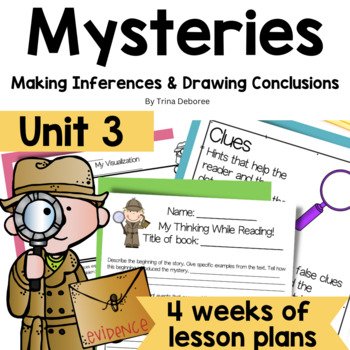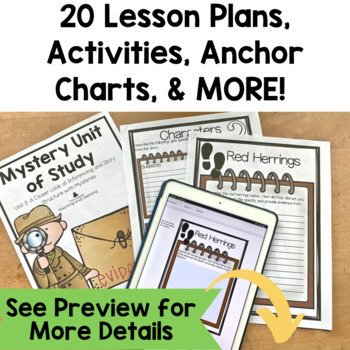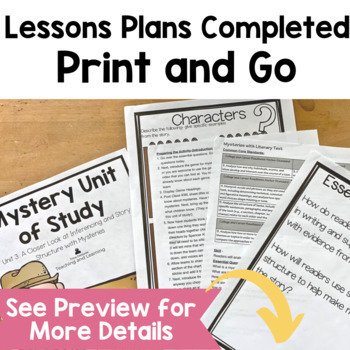Making Inferences & Drawing Conclusions With Mysteries Interactive Read Aloud
Mysteries are the key to teaching your students how to make inferences, draw conclusions, ask and answer questions, and engage deeply with text!
You're probably thinking, mysteries for elementary students? But the truth is, mysteries are perfect for second-grade teachers who want to engage their students in critical thinking.
Mystery stories are exciting, and they teach your students how to think like detectives. Mysteries are also perfect for teaching literary vocabulary, text structures like cause and effect, and character development.
And the best part is that Making Inferences & Drawing Conclusions Using Mysteries Interactive Read Aloud lesson plans makes it easy for you to teach these concepts to your students.
These lesson plans are standards-based and include high-engagement strategies that will keep your students motivated and excited about reading.
So if you're looking for a way to engage your students in critical thinking, then you need my Making Inferences & Drawing Conclusions Using Mysteries Interactive Read Aloud lesson plans.
Click the view preview button above for a sneak peek inside of this resource, or better yet, click add to cart to download your lesson plans now.
This unit is intended to be used over four weeks but can easily be adjusted to meet your needs.
Included in the Packet:
* Highly Effective Lesson Plans include essential questions, gradual release of responsibility model, high engagement cooperative learning structures incorporated, rubrics to help make students aware of criteria in advance, higher-order questions, standards-based lessons, and beginning and ending review
* Graphic Organizers that can be used with easy to find literature
* Formative Assessment
* Anchor Charts
* Writing in response to reading
* Vocabulary
* Reading and Discussion Tasks including
Asking Questions (text-based)
Predicting/Inferring and Visualizing
Connecting Background Knowledge
Integrating Knowledge and Ideas
Character Responses
Points of View
Cause and Effect
Story structure
Language Tasks
Vocabulary
Writing Tasks
Writing about reading (answering text-based questions and retelling)
Writing opinion pieces about hunches or motives in the mystery with supporting evidence from text
Speaking and Listening
Collaborative conversations about text
Foundational Skills
Fluency work
Authors Chosen for this unit
These are suggested books. (Copies of the books are NOT provided):
Mini Mysteries (Provided)
Nate the Great by Marjorie Weinman Sharmat
Nancy Drew and the Clue Crew The Case of the Sleepover Sleuths by Carolyn Keene
Encyclopedia Brown Solves Them All (The Case of the Super-Secret Hold) by Donald J. Sobol
Encyclopedia Brown Solves Them All (The Case of the Missing Clues) by Donald J. Sobol





